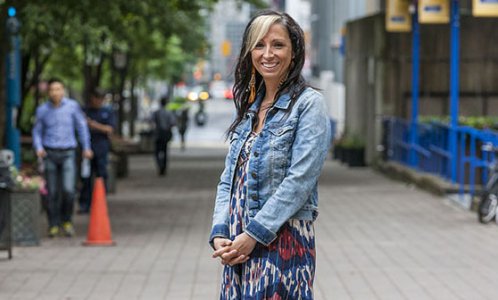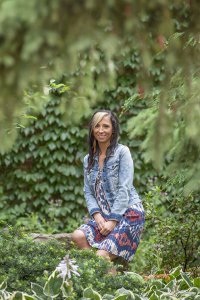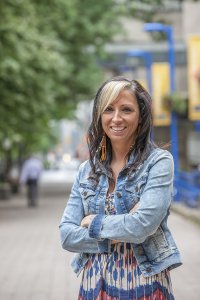
Pamela Palmater (LLM’99, JSD’09): The Nation-Builder
By Mark Campbell
Pamela Palmater (LLM’99, JSD’09) has a wish: she wants to be overwhelmed by nation-building efforts in the Mi’kmaw Nation. Overwhelmed, she clarifies, to the point where she is worn to the bone from mentoring, teaching and working with youth who want to build a strong nation.
“I want to literally collapse at the end of the day because we have too many businesses, conservation projects and new ideas to keep up with,” she explains. “And when we can’t possibly do any more in the Mi’kmaw Nation, I want to be exhausted from working with other indigenous nations to get them to the same stage.”
It’s a wonder this lawyer, educator and activist isn’t exhausted already. For years, she’s dedicated virtually every moment of her day to First Nations advocacy, and she has had a considerable impact on the quality of life of Canada’s indigenous nations. As the former legal counsel with Aboriginal Affairs for Justice Canada and director of Lands and Trusts Services for Indian and Northern Affairs Canada, she helped shift government policy in a more just direction. She’s since used that experience to play a key role in opposing bills that would have decimated or failed to protect the rights of indigenous women. And as the Chair in Indigenous Governance at Ryerson University, she is working with First Nations across Canada on issues such as laws, policies and nation-building. Until First Nations are afforded the same human basics that most Canadians take for granted – clean water, healthy food, education and health care – there is no rest for her.
“I live what I study and I have suffered what I advocate against,” she explains. “I couldn’t do anything else but what I am doing.”
Furthering First Nations’ rights
Palmater’s devotion to advocacy was all but pre-ordained. From an early age, and from the example set by her family, she believed being Mi’kmaw meant standing up not just for your rights, but for those of your family, community, nation and anyone unable to stand up for themselves. She became attracted to law as a means of furthering First Nations’ rights when she noticed lawyers always accompanied government officials in negotiations with aboriginal organizations.
“We were always out-funded, out-numbered and out-lawyered at every table. I thought I could help turn the tables on them if I got a law degree and learned their legal system, since they don’t know or study the Mi’kmaw legal system.”
Attracted by Dalhousie University’s graduate program in law, Palmater enrolled. “They recognized the unique rights and interests of Mi’kmaw people in relation to Canada’s legal system. Dalhousie had professors who worked on litigation involving indigenous rights, professors who were experts in natural resource and environment law, health law, poverty law and many social justice topics. I made the right choice as my professors constantly challenged me at every level to make my work the best it could be.”
Palmater lived on social assistance in off-reserve aboriginal social housing while going to university. Challenging as that may sound, she believes her situation paled in comparison with other First Nations women. “Many could not find employment, had serious health issues or struggled with numerous socio-economic indicators such as homelessness, over-crowding, no running water, no education funding and so forth. I had an obligation to use whatever opportunity I had – including the chance to go to law school – to try and confront these injustices.”
That sense of obligation also led her, despite misgivings, to try to change things from the inside, as a federal government employee. Though she met many professionals dedicated to change, and gained considerable legal, policy and negotiation experience, she ultimately determined it was more effective to advance indigenous rights and interests from the outside. In fact, she prefers to work independent of any aboriginal organization so that her advocacy is not influenced by corporate or bureaucratic agenda – good or bad.
“Society sometimes too easily dismisses credible, factual information because of the affiliations or associations of the speaker,” Palmater observes. “While having extensive education and experience in this area helps with my credibility as an expert witness or commentator, most grassroots people who have given me feedback comment on my independence as a key factor for why they consider what I have to say about a piece of legislation, for example.”
A continuous fight
Palmater has received considerable praise for her efforts to repeal sections of federal bills that would have perpetuated the disadvantage and oppression of indigenous women. They include C-3 Gender Equity in Indian Registration and S-4, which deals with matrimonial property on reserve.
“In an indigenous context, an attack on women means an attack on the entire community and nation,” says Palmater, whose book Beyond Blood: Rethinking Indigenous Identity explored issues of discrimination within Canadian law. In the first chapter, Palmater recounts how her grandmother’s Indian status and membership were taken, and how she and her father lacked status as a result of that decision.
“Eliminating women or children from the registration list or membership list speeds the process of legislated elimination of Indians altogether. No legally recognized Indians in a First Nation often means no band members. No band members means no legal entity for which to hold reserve lands and treaty rights, for example, and it all escheats back to the Crown. Once First Nations understand the real objective behind discriminating against indigenous women, the easier it is to advocate for substantive changes.”
That is why Palmater continues to fight for First Nations access to clean water, healthy food, warm housing and programs and services that enrich and nurture indigenous children. “If that could happen today, then the rich vibrant cultures of our indigenous nations would be guaranteed to survive another seven generations. If we cannot protect our children, we will never see our seventh generation.”
 It is also our best hope for safeguarding all the things we hold dear as Canadians or First Nations – our lands, waters, plants and animals. Aboriginal, treaty and inherent rights, she notes, give legal and political teeth to the protection of our lands and waters. “Canadians need our rights to protect their own children in the future. If there is no more farmable land or drinkable water, we all die. We have an opportunity to come together as partners and set the Canadian government back on track and protect what is most important for our future, not what is most profitable for our present.”
It is also our best hope for safeguarding all the things we hold dear as Canadians or First Nations – our lands, waters, plants and animals. Aboriginal, treaty and inherent rights, she notes, give legal and political teeth to the protection of our lands and waters. “Canadians need our rights to protect their own children in the future. If there is no more farmable land or drinkable water, we all die. We have an opportunity to come together as partners and set the Canadian government back on track and protect what is most important for our future, not what is most profitable for our present.”

